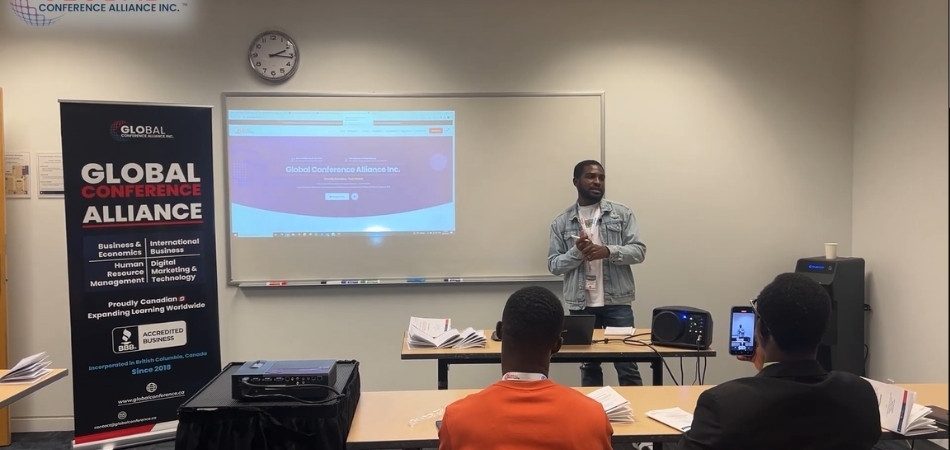Taking part in a business conference is an exciting and valuable experience for professionals who want to expand their knowledge and network. However, with so many sessions to choose from, it can sometimes be overwhelming to make the best selection. Now, you might be wondering: How to choose the right sessions at business conferences?
To choose the right sessions at business conferences, start by defining your personal and professional goals. Consider topics that align with your needs, whether you’re gaining industry insights or improving specific skills. Additionally, research the speakers’ expertise and choose sessions that offer valuable takeaways in your field of interest.
Are you curious how to make the most of your business conference experience? In this article, you will find all the essential information on choosing the right sessions at business conferences, ensuring you attend the most relevant and beneficial ones for your career.
How to Prepare for an International Business Conference?
Preparing for an international business conference requires careful planning to make the most of the opportunity. Business conferences vary by region, with each offering different cultural and professional experiences.
The focus of European conferences is often innovation and collaboration, whereas the focus of Asian conferences is technology and emerging markets. Canada, known for its diverse business landscape, hosts events that prioritize sustainable practices and global networking.
To prepare, start by researching the event’s agenda, speakers, and participants to identify relevant sessions and networking opportunities. Update your professional portfolio, including your resume and business cards, and ensure your online profiles are polished. Practice your pitch or presentation to leave a lasting impression during discussions.
If you’re attending international business conferences in Canada, focus on learning about its industries, such as technology, natural resources, and finance. Familiarizing yourself with local etiquette and building cross-cultural communication skills will improve your experience.
How to Choose the Right Sessions at Business Conferences?
Choosing the right sessions at business conferences can significantly improve your learning and networking opportunities. You should approach your choice thoughtfully when there are so many options available. Here are some key considerations to help you make the best selections.
Define Your Goals for Attending the Conference
Before diving into the session lineup, take time to define your personal and professional goals for attending the conference. Are you looking to gain new industry insights, expand your network, or learn practical skills? Knowing your objectives will guide your decision-making when choosing which sessions align with your needs.
Research the Speakers and Their Expertise
The quality of a session is often tied to the expertise of the speaker. Look into the backgrounds of the speakers and their accomplishments. Are they recognized experts in the field? Do they have a proven track record of delivering valuable insights? Prioritize sessions led by speakers who can offer actionable insights and fresh perspectives on topics of interest.
Assess the Relevance of Session Topics
Not all sessions will be directly relevant to your current business needs. Review the session descriptions carefully and assess how well the topics match your professional interests or challenges. For instance, if you’re focusing on leadership development, select sessions that delve into management strategies or organizational culture. Stay focused on the content that will add the most value to your career.
Consider the Session Format and Interaction Level
Different sessions offer varying levels of interaction, such as keynote speeches, workshops, and panel discussions. Consider your preferred learning style when selecting sessions. Do you thrive in hands-on environments, or do you prefer listening to expert opinions? Choose sessions that match your learning preferences to ensure you make the most of your time.
Plan for Networking Opportunities
Business conferences are an excellent platform for networking. Some sessions may offer more opportunities for interaction and connection with other attendees. If building your professional network is a priority, select sessions that encourage discussions, small group activities, or meet-and-greets. These interactions can lead to valuable partnerships and collaborations long after the conference ends.
Consider Session Timing and Overlaps
When selecting sessions, keep track of their timings to avoid scheduling conflicts. Many conferences host multiple sessions simultaneously, so prioritize your choices carefully. If two sessions you’re interested in overlap, weigh the potential benefits of each and select the one that aligns best with your goals for the event.
Who Are the Possible Attendees of an International Business Conference?
International business conferences bring together diverse professionals, creating a platform for networking, learning, and collaboration. These events often attract individuals and groups from various industries, each with different goals and interests. Below are the types of attendees that can help organizers and participants improve their approach to maximum engagement and value.
Corporate Executives and Decision-Makers
Corporate executives, such as CEOs and CFOs, attend to discuss industry trends and potential partnerships. They are often looking to establish strategic alliances or explore new markets for their businesses. These decision-makers contribute valuable insights, shaping discussions about global business strategies.
Entrepreneurs and Start-up Founders
Entrepreneurs and start-up founders participate to showcase their innovative ideas and products. They often seek investors, mentors, or collaborators to accelerate their ventures’ growth. Such attendees bring fresh perspectives, energizing the conference with their passion and creativity.
Industry Experts and Academics
Industry experts and academics join to share their research, insights, and forecasts on market developments. They often conduct workshops or presentations, providing attendees with actionable knowledge. Their participation enables a connection between theory and practice, enhancing the conference’s intellectual value.
Investors and Venture Capitalists
Investors and venture capitalists, usually eligible for attendance at international conferences, participate to scout for promising business opportunities and startups. They engage in networking sessions to identify potential projects that align with their investment strategies. Their presence helps promote financial growth and innovation within the business ecosystem.
Government Officials and Policy Makers
Government officials and policy makers attend to discuss regulations and policies impacting international trade and business. They often serve as keynote speakers, offering insights into economic trends and cross-border collaborations. Their involvement ensures attendees are informed about policy changes and implications.
Top Tips for Making Smart Session Choices at Business Conferences
Choosing the right sessions at a business conference is key to making the most of your time and investment. Here are some practical tips to guide your decision-making process.
Align Sessions with Your Professional Goals
Start by identifying your professional objectives for attending the conference. Are you looking to strengthen your leadership skills, dive into a specific industry trend, or expand your network? Choose sessions that directly align with these goals, ensuring that each session you attend contributes to your development and long-term career growth.
Prioritize Quality over Quantity
It’s tempting to attend as many sessions as possible, but this can lead to burnout. Instead, focus on fewer, higher-quality sessions that promise more in-depth insights and opportunities for engagement. This approach allows you to fully engage yourself in the topics that matter most without feeling rushed or overwhelmed.
Consider the Speaker’s Expertise
The speaker’s credibility can significantly impact the value of a session. Research the background of the speakers beforehand to gauge their expertise and experience in the subject matter. Prioritizing sessions led by recognized thought leaders or experienced professionals will ensure you gain valuable, actionable insights.
Look for Interactive and Engaging Formats
Some sessions are designed to be more interactive, offering the chance for discussions, Q&A, and networking. If you prefer engaging formats over traditional lectures, seek out workshops, roundtable discussions, or sessions that encourage participation. These sessions tend to offer deeper learning and more networking opportunities.
Balance Your Schedule with Downtime
Taking part in relevant sessions is important, but allowing time for reflection and rest is equally important. Overloading your schedule can lead to information overload. Be sure to balance your session choices with some downtime for networking, relaxing, and absorbing what you’ve learned.
How to Maximize Your Business Conference Attendance?
Attending a business conference is a valuable opportunity to grow your knowledge, expand your network, and gain new insights. Before diving in, you have to know the steps to attend international business conferences, from registration to travel arrangements. To get the most out of the experience, here are some practical tips to maximize your attendance.
Set Clear Objectives Before You Go
Before the conference, take some time to define your goals. Do you want to learn about new industry trends, meet potential clients, or develop specific skills? Having clear objectives will help you focus on the sessions and activities that align with your priorities, ensuring that you make the most of your time there.
Network with Purpose
Conferences provide an excellent platform to connect with industry professionals. Come prepared with a strong introduction and business cards to help you make meaningful connections. Focus on engaging with people who share similar professional interests or can provide valuable insights or collaborations. Networking with purpose can lead to lasting relationships and future opportunities.
Plan Your Sessions Strategically
Review the conference agenda carefully and select sessions that are most relevant to your goals. While it may be tempting to attend every session, remember that quality matters more than quantity. Prioritize workshops, panel discussions, and keynotes that offer the most value to your personal and professional growth.
Make Time for Breaks and Reflection
Amidst all the learning and networking, be sure to take breaks. Downtime allows you to reflect on the information you’ve gathered, process new ideas, and avoid feeling overwhelmed. Sometimes, these quiet moments can lead to valuable insights or connections you might have missed in the hustle of the event.
Follow Through After the Conference
Once the conference ends, take the necessary steps to stay in touch with the people you met and follow up on the insights you gained. Greeting new contacts, thanking speakers, and continuing your learning are all good ways to keep your learning going. Following through on your connections and learnings will help solidify the value of attending the conference.
Frequently Asked Questions
Selecting the right sessions at business conferences is essential for making the most of your time and gaining valuable insights. Here are some frequently asked questions to help guide you in making informed session choices.
How Do I Know If a Session Is Worth Attending?
To determine whether a session is worth attending, look for detailed session descriptions, speaker credentials, and the session’s alignment with your goals. Reading reviews or feedback from past attendees can also provide insight into the session’s quality and relevance.
How Can I Balance Learning with Networking at a Conference?
While attending sessions, balance your learning with opportunities for networking by selecting events that allow both. Choose workshops or panel discussions that encourage attendee interaction. Also, schedule networking breaks and informal events between sessions to connect with others in your field.
Should I Attend Sessions on Emerging Trends or Focus on Core Topics?
It depends on your career goals. If you’re looking to stay ahead of the curve, attending sessions on emerging trends can be beneficial. However, if strengthening your foundation in core topics is your priority, focus on sessions that cover these essential areas in depth.
How Can I Choose Sessions That Align with My Team’s Needs?
If you’re attending with a team, coordinate with them beforehand to ensure your session choices align with the group’s needs. Look for sessions that address challenges your team faces or offer skills that will benefit your collective work in the future.
Can I Change My Session Choices During the Conference?
Yes, many conferences allow you to switch sessions on the spot, especially if they are not fully booked. However, it’s best to arrive early to secure your spot. Flexibility is key, but make sure any changes still align with your goals and objectives for the event.
Final Thought
By now, you should have a clearer idea of how to choose the right sessions at business conferences. By focusing on your goals, researching speakers, and considering session formats, you’ll be able to select sessions that align with your professional needs and maximize your conference experience.
Remember to prioritize quality over quantity, balance your schedule with networking opportunities, and allow time for rest. Following these tips will help you make the most of your time. Best of luck in selecting the right sessions, and enjoy your next business conference experience!








